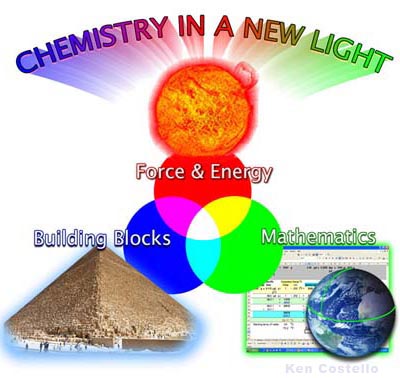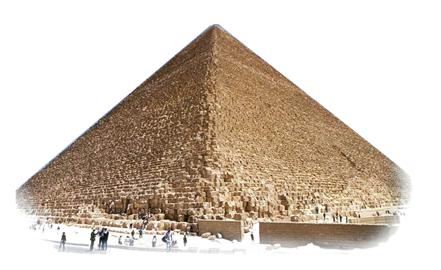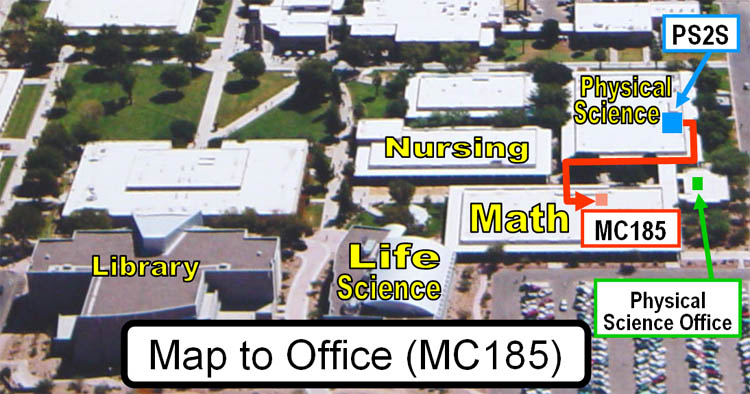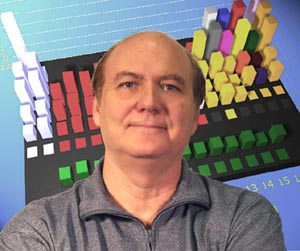|
MCCCD Official Course Outline
|
Textbook
|
CHM151 Lab
|
Lecture Titles
|
I. Definition of "chemistry"
A. History
B. Scientific method
|
Chapter 1 |
Scientific method
integrated in all labs. |
Why is Chemistry a Science?(IA,B)
|
II. Measurement
A. Metric system
B. Significant figures
C. Exponential notation
D. Dimensional analysis
|
Chapter 1 |
Measurement integrated
in all labs. |
Metrics & Dimensional Analysis (IIA,D)
Fuzzy Numbers (IIB,C)
Once There Was Nothing (IIA-D)
|
III. Matter
A. States of matter
B. Classification of matter
C. Properties of matter
D. Physical and chemical changes
E. Atomic theory
F. Formulas and nomenclature of substances
G. IUPAC nomenclature
|
Chapter 2 |
Lab 2 covers
formulas and nomenclature and chemical changes (IIID,F,G) |
Matter of Fact (IIIA-D)
What's In a Name? (IIIF-G)
Polyatomic ion Nomenclature and Uses (IIIF,G)
|
IV. Chemical reactions
A. Balancing equations
B. Types of reactions
C. Net ionic equations
|
Chapter 3, Chapter 4 |
Lab 3 covers types of
reactions and balancing.
Lab 4 covers ionic equations. |
Target of Chemistry (IVA,B) |
V. Mole calculations with formulas & equations
A. Atomic and molecular weights
B. Mass-mole conversions
C. Percentage composition
D. Empirical and molecular formula
E. Stoichoimetry
F. Limiting reagents and percentage yields
G. Solution stoichiometry
|
Chapter 3 |
Lab 5 involves finding
the empirical formula of copper chloride. Most labs from 5 on will cover
concepts from section V. |
Art of Counting Without Counting (VA-F)
Molarity Requires Concentration (VC,G)
|
VI. Gases
A. Gas laws
B. Stoichiometry with gases
C. Kinetic molecular theory
|
Chapter 5 |
Lab 13 "Molar
Mass of a Gas" requires knowledge of gas laws. |
Putting Gases to
Work (VIA-C) |
VII. Thermochemistry
A. Temperature/heat
B. Energy and units
C. Calorimetry
D. Enthalpy and enthalpy changes
E. Hess's law
|
Chapter 6 |
Lab 9 "Thermochemistry" covers
all of these principles. |
Turning on the Heat (VIIA-D)
Art of Measuring Energy (VIID,E)
|
VIII. Atomic theory and periodic table
A. Fundamental particles
B. Isotopes
C. Quantum theory and electronic structure
D. Periodic table and trends
|
Chapter 7, Chapter 8 |
Lab 10 "Atomic
Spectra & Electron Energy Levels" |
Chaos to Order(VIIIA,D)
Where did Elements Form? (VA,B)
The Elegant Universe (VIIIC)
|
IX. Chemical bonding
A. Ionic and covalent bonds
B. Electron dot structures
C. Electronegativity
D. Shapes and polarities of molecules VSEPR
E. Hybrid orbitals
|
Chapter 9, Chapter 10, Chapter
11 |
Labs
11 & 12 "Lewis
Structures and Valence Shell Electron Pair Repulsion (VSEPR).
Lab 2 (IXA) |
Bonding and Representation of Bonds (IXA-C)
Molecular Geometries Explained with VSEPR (IXD,E)
|
X. Solids and liquids
A. General properties
B. Changes of state
C. Intermolecular attractions
D. Types of solids
E. Phase diagrams
|
Chapter 12 |
Lab 14 "Evaporation
and Intermolecular Attractions and Heat of Fusion for Ice" (XB,C,E)
|
Chemistry Isn't Always Hard,
Sometimes it's Liquid (XA-E) |
XI. Solutions
A. Definitions
B. Terminology
C. Concentration and stoichiometry
D. Colligative properties
|
Chapter 13 |
Labs 7 & 8 "Acid/Base Titrations" (XIA-C)
Lab 15 "Freezing Point Depression"
|
Molarity Requires Concentration (XIA-C)
Colligative Properties (XID)
|










